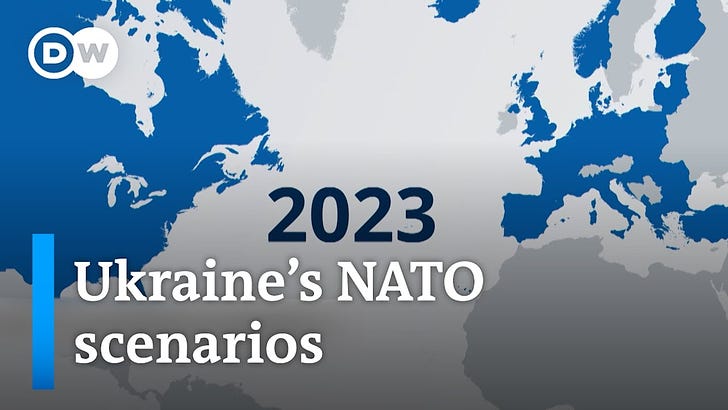Deutsche Welle has a briefing on this week’s NATO meeting in the Lithuanian capital of Vilnius.1
Much of the commentary on the upcoming summit focuses on the question of NATO membership for Ukraine, which will not happen right away. Joe Biden told CNN:
“I don’t think there is unanimity in NATO about whether or not to bring Ukraine into the NATO family now, at this moment, in the middle of a war,” Biden said. “For example, if you did that, then, you know – and I mean what I say – we’re determined to commit every inch of territory that is NATO territory. It’s a commitment that we’ve all made no matter what. If the war is going on, then we’re all in war. We’re at war with Russia, if that were the case.” …
“But I think it’s premature to say, to call for a vote, you know, in now, because there’s other qualifications that need to be met, including democratization and some of those issues,” Biden said. [my emphasis]2
This is pretty straightforward, and isn’t said often enough by talking-head analysts. Even if Ukraine were in control of all of its territory, it wouldn’t yet meet the requirements. And, yes, there are minimal requirements of democratic governance for entry into NATO.
While Biden’s statement is basically correct that if NATO accepted Ukraine right now it would immediately trigger the mutual-defense clause, which would mean NATO would be at war with Russia, aka, World War Three.
There is an important qualification, though. Even when the mutual-defense case if formally invoked, the NATO treaty says that each country must follow its own constitutional procedures in entering into war. In the case of the United States, that would require a Congressional declaration of war. Of course, the last time that happened was when the US formally entered the Second World War.
The mutual-defense clause of the EU treaty looks more binding on the face of it than the NATO one, though the EU as such has only a marginal military capability. But NATO has always been primarily a defensive alliance against the Soviet Union and then Russia, despite post-1989 efforts to expand that definition. By almost any perspective, for NATO not to collectively respond militarily when one of its members is militarily attacked by Russia would largely nullify its purpose.
“Credibility” is one of the most overused words in US foreign policy. But in this case, it’s relevant. The reason eastern European countries like Poland and the Baltic states were so eager to become NATO members was to deter Russian aggression. Accepting Ukraine as a NATO member and then declining to directly intervene in the ongoing would drastically change how the world perceives the alliance.
From Ukraine’s current viewpoint, it would seem to be very much in their immediate national interest at the moment to have NATO intervene directly. Whether initiating a Third World War in Europe in 2023 is in the interest of everyone else is another question.
It’s worth noting here if NATO accepted Ukraine as a member but restricted the mutual-defense guarantee to areas not occuped by Russia, that would also be a drastic departure from current practice. The example of West Germany as a NATO member could offer some kind of model for such an arrangement. But similar the case of East Germany, that would be not just a de facto acknowledgment but an explicit acknowledgment by NATO that it was accepting East Germany’s border indefinitely, which in any case it had done at the end of the Second World War.
Sweden’s NATO membership is also pending, currently being blocked by Turkey. But Sweden has also formally met all the qualifications and has been closely coordinating with NATO for years. Turkey stalling is a bargaining chip for President Tayyip Erdoğan’s government over other issues, as he seems to be especially fond of doing.
Robert Hunter mentions the elephant - or maybe the bear - that will not be in the room in Vilnius:
Even more consequential for the long term is an issue that won’t arise at Vilnius: what role Russia can play in European security after the war is over. Since the end of the Cold War, the Western allies, especially the United States, have pondered what to do about the key remnant (Russia) of the dismembered Soviet Union. George H. W. Bush proposed a “Europe whole and free” and Bill Clinton followed suit. Both administrations thought it most important to avoid what was done to Germany in the 1919 Treaty of Versailles, whose War Guilt Clause (231) required Germany to accept full responsibility for the war. In his rise to power, Hitler made much of what he represented as national humiliation.3 [my emphasis]
Joining NATO is a dream for Ukraine. But how realistic is it? DW News YouTube channel 07/07/2023. (Accessed: 2023-10-07).
Herb, Jeremy (2023): CNN Exclusive: Biden says war with Russia must end before NATO can consider membership for Ukraine. CNN Politics 07/09/2023. <https://edition.cnn.com/2023/07/09/politics/joe-biden-ukraine-nato-russia-cnntv/index.html> (Accessed: 2023-10-07).
Hunter, Robert (2023): The elephant in the room at next week’s NATO summit. Responsible Statecraft 07/07/2023. <https://responsiblestatecraft.org/2023/07/07/nato-summit-will-map-out-future-ties-to-ukraine/> (Accessed: 10-07-2023).


